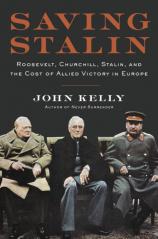Saving Stalin: Roosevelt, Churchill, Stalin, and the Cost of Allied Victory in Europe
Review
Saving Stalin: Roosevelt, Churchill, Stalin, and the Cost of Allied Victory in Europe
This well-researched history tracks how the course of World War II influenced Josef Stalin’s standing with his allies, so “saving” Stalin takes on multiple meanings. Readers will learn how Franklin Roosevelt and Winston Churchill worked to keep Stalin as an ally in the early years, as he threatened to switch back to his pact with Adolf Hitler and later tried to placate him when he became “the indispensable ally,” fighting and winning on multiple fronts simultaneously.
"SAVING STALIN offers a thoughtful analysis of the compromises leaders made to win a war, the outcome of which would have been uncertain without those difficult choices."
The book, which relies on --- and credits --- a slew of WWII historians’ scholarship, details the ebb and flow in relations among Stalin, FDR, Churchill and other allies as Russia took a more crucial role in fighting off the Axis powers. FDR made more of a positive impression on him, in part because of the U.S.’s might, but also due to his charm and possibly because Stalin thought he could manipulate him more successfully than he could Churchill.
What comes across most clearly is Stalin’s desire to accrue power, measured in land mass, and his belief that bodies could be thrown at any problem --- Russian soldiers died in far greater numbers than their British or American counterparts. But he was also a consummate liar, willing to make the allies believe that he was playing by the same rules that governed them.
Though author John Kelly explores the interrelationships of the three leaders --- and demonstrates how frayed Churchill and FDR’s bond was towards the end of the war --- the book closely chronicles the course of the war from 1941 to Germany’s surrender in May 1945. It covers in great detail the buildup to Operation Overlord, which Stalin had been pushing for and Churchill had wanted control over, in terms of both timing and leadership. Kelly ultimately demonstrates how Hitler’s ability to control his own cabinet had weakened, as its members began to fear their conquerors more than their Führer’s wrath.
SAVING STALIN offers a thoughtful analysis of the compromises leaders made to win a war, the outcome of which would have been uncertain without those difficult choices.
Reviewed by Lorraine W. Shanley on October 23, 2020
Saving Stalin: Roosevelt, Churchill, Stalin, and the Cost of Allied Victory in Europe
- Publication Date: October 6, 2020
- Genres: History, Nonfiction
- Hardcover: 384 pages
- Publisher: Hachette Books
- ISBN-10: 030690277X
- ISBN-13: 9780306902772



